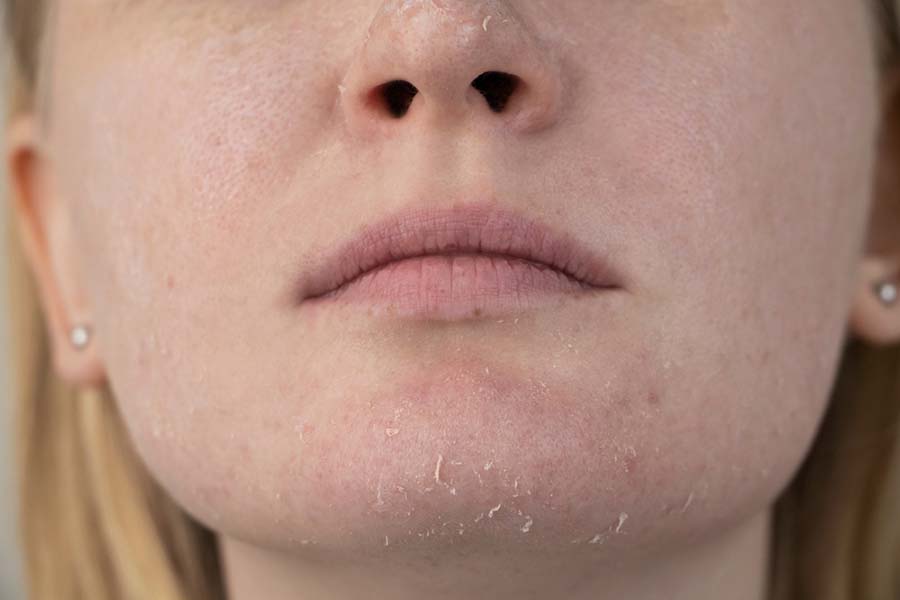Dry vs. Dehydrated Skin: What You Need to Know

By Alona Siniehina / Shutterstock.com
While many people in the skincare world use the words “dry” and “dehydrated” interchangeably, these mean two separate things. We’ll explain the difference between dry and dehydrated skin and explore what skincare for sensitive skin you should use if your face is tight and flaky.
Dry vs. Dehydrated Skin
Dry skin is a skin type that is characterized by a lack of oils and lipids. Having dry skin is largely determined by genetics, but certain environmental factors can also make dry skin worse. For example, cold or dry climates, long hot showers, certain skincare products, some medical treatments, and the natural aging process can all lead to dry skin.
Dehydrated skin is a skin condition that anyone can get. Dry skin is characterized by a lack of water in the top layer of the skin. Dehydrated skin can be caused by many different factors, including not drinking enough water, a damaged skin barrier, and extreme weather conditions.
While dehydrated skin can happen to anyone, people with dry skin are more likely to have dehydrated skin. This is because the natural oils in our skin help to prevent water loss. If you don’t have enough oils to form that natural barrier, then water can evaporate more easily from the top layer of your skin.
The symptoms of dry vs. dehydrated skin can sometimes be very similar. The skin will often feel tight, rough, and/or itchy especially after cleansing. You may notice dull or flaky patches on your skin, and your skin might scale or peel off. You might also notice more prominent fine lines and wrinkles, as well as under eye bags. Dehydrated skin also lacks elasticity and won’t spring back as quickly as normal. For more information, see our ultimate guide that explains “Why is my skin so dry even when I moisturize?”
Find Out What Skincare Method Is Best for You

By ADragan / Shutterstock.com
How to Treat Dry and Dehydrated Skin
Got either dry or dehydrated skin (or both)? Here are six tips to help you find relief:
Choose the right ingredients.
If you are struggling with dry skin, then you will want to reinforce your natural lipid barrier by looking out for ingredients such as shea butter, coconut oil, squalene oil, mineral oil, lanolin, and other oils. If you are struggling with dehydrated skin, look for ingredients that will pull moisture into your skin, such as glycerin, aloe, honey, and snail mucin. Certain ingredients, such as hyaluronic acid and ceramides, are beneficial for both dehydrated and dry skin.
Seek out skincare for sensitive skin.
In addition to seeking out specific ingredients, you might also want to prioritize skincare kits for sensitive skin. Dry, dehydrated skin is prone to irritation, and choosing skin care for sensitive skin will help to nourish it while you work on restoring your skin barrier.
Get a gentle cleanser.
Cleansing can be one of the most drying, stripping steps of your skincare routine. Instead of a foaming or gel cleanser — which can be rather harsh — choose a gentle milk or cream face wash that will cleanse your skin without making it feel dry and tight. Massage the cleanser into your face for no more than 60 seconds, and then rinse it off with lukewarm water.

By siro46 / Shutterstock.com
Take shorter showers.
We love a long, hot shower as much as the next person, but unfortunately all that water exposure will dry your skin right out. Try to limit your showers to 5-10 minutes, and avoid soaking in the bath for long periods of time. Also keep the temperature set to lukewarm or even cool; hot water will dry your skin out faster than cool water.
Drink enough water.
As you hydrate your face from the outside in, you also need to make sure that you are hydrating from the inside out as well. Make sure that you are drinking enough fluids each day, and try to limit your consumption of dehydrating beverages such as caffeine and alcohol. Instead, try infused water and caffeine-free herbal tea to stay hydrated throughout the day.
Try a humidifier.
If you live in a dry climate, the lack of moisture in the air could definitely be making your skin dry or dehydrated. Buy a humidifier and run it at night while you sleep to put some moisture back in the air and alleviate your dehydrated skin. Many people like to do this in the wintertime, but you might need to run a humidifier all year round if you live somewhere very dry.
Ready to get relief for dry, dehydrated skin? Check out Lancer Skincare’s collection of products for sensitive skin today and get free shipping on your U.S. order, no order minimum needed!
 PREVIOUS (Reasons Why Lip Care Is Essential)
PREVIOUS (Reasons Why Lip Care Is Essential) NEXT (What Type of Skin Do I Have?)
NEXT (What Type of Skin Do I Have?)